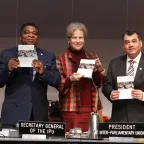Messaging apps: an untapped humanitarian resource
… of migration flows and the fight against terrorism). The risk of misuse of data may have …
… of migration flows and the fight against terrorism). The risk of misuse of data may have …
The catalogue presents a comprehensive list of publications and films available in Arabic. Each entry is in Arabic and English and gives the publication or film's reference number and website link. …
… of Cambodia and the National Counter-Terrorism Committee to impress upon …

… as an observer in the SCO joint anti-terrorism military exercise "Peace Mission …
… 62 Part 3: A topic-based approach 65 IHL and terrorism 66 Rape and other forms of sexual … armed conflicts, ranging from acts of terrorism to sexual violence and from the use … availability of weapons, the spread of terrorism, and the growing number of asymmetric …

… Bruges Colloquium , 20 -21 october 2016 Terrorism is a scourge to which the … with increased risks of terrorist acts. Terrorism is a global phenomenon sometimes … community is increasingly facing. Terrorism negates the fundamental principles of …

… serious violations of IHL, including acts of terrorism and sexual and gender-based violence. …
… by the ICRC, New York, October 2016. Terrorism negates the fundamental principle of … of the Red Cross (ICRC) condemns acts of terrorism, whether committed within or outside … armed groups which resort to acts of terrorism is a growing concern domestically and …
This report draws on some recent operational experiences of the ICRC to describe the theory and practice of the ICRC's approach to humanitarian assistance in protracted conflict. The ICRC spends …

… and of human rights law, including acts of terrorism and sexual and gender-based violence. …

Try one of the following resources:
Created in 1863, the ICRC library, alongside the ICRC archives, provides an indispensable documentary reference on the organization itself and international humanitarian law.
International humanitarian law is based on a number of treaties, in particular the Geneva Conventions of 1949 and their Additional Protocols, and a series of other instruments.
Customary international humanitarian law consists of rules that come from "a general practice accepted as law" and that exist independent of treaty law.